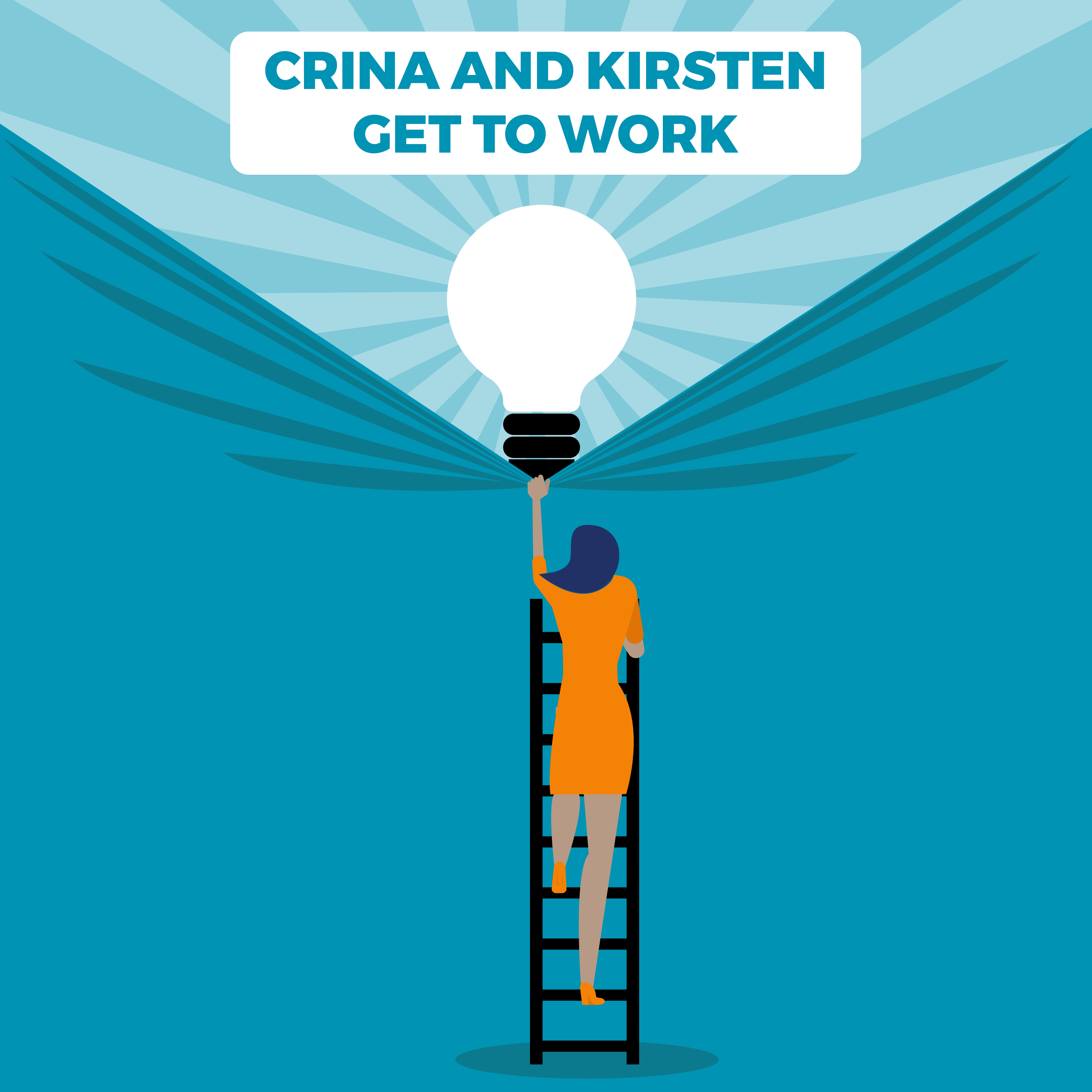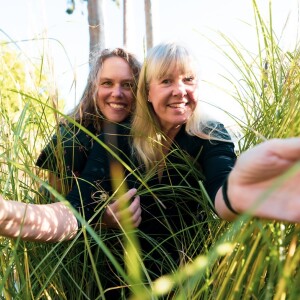Crina and Kirsten Get to Work

We have one single mission: Help women find ease, meaning and joy at work and in life. We use our experiences as business owners, entrepreneurs, mentors and inspirational leaders to explore topics that all working women care about: shitty bosses; smashing the patriarchy; balancing work and life; navigating change and getting what you want! We guarantee that you will be entertained and inspired... promise!
Episodes
Episodes



Friday Sep 27, 2024
I Don't Like You: How To Deal With Coworkers Who Drive You Nuts
Friday Sep 27, 2024
Friday Sep 27, 2024
A survey by LLC Inc. of over 1000 people across the US with an average age revealed that 83% of us have coworkers who annoys us, 21% have been so annoyed by a coworker they have considered quitting, and 52% say annoying coworkers prevent them from doing their best work. Yowza - that is something. And what don’t we like about our coworkers? We do not like complainers, laziness, arrogance (our personal favorite), too much talking, negativity, entitlement (okay so maybe this is our favorite), poor communication, oversharing, or gossipping.
So, what do you do when you’re stuck working with someone you dislike? There are some good strategies, but first, get some perspective. How much does it matter and are there ways of looking at it differently?
What to do:
As always, the person we control is ourselves, so when we have feelings of dislike for a coworker, looking inward can be very helpful. Do you let your brain run with every little incident? What do our reactions say about us?
Here is the hard one - be the grown up. The emotionally intelligent grown up. We can stay away from the resentment spiral and remove ourselves from unproductive conversations.
Work very hard to find something you like or admire. People are rarely just one thing and we can usually find something to like or admire.
Being anything less than respectful ends up leaving us with metaphorical egg on our faces. Try compassion and respect - who knows, we may find ourselves surprised by the person we dislike.
If we feel pretty confident with checking in with ourselves, being the grown up, seeing the good and embracing compassion and respect, we will find ourselves in connection, which of course is the big payoff.
And if we cannot get to connect, then we can be strategic about how we expose ourselves, which includes being very intentional about what we need from the interactions we really have to have with the coworkers we do not like.
Not everyone we work with needs to be our friend or even someone we like. While it sure is great when it happens, we can work well when we respect others and ourselves.
Survey Reveals the Most Annoying Coworker Habits - LLC.org
How to Work with Someone You Really Don’t Like



Friday Sep 13, 2024
Friday Sep 13, 2024
Unpack the magic of saying “yes” more often, the beauty of spontaneous connections, and why your next best decision might just be unplanned. Even at work!
Most of us pride ourselves on our planning – we are prepared, we are ready for anything and we are efficient and effective – BUT, let’s consider the unplanned.
SpontaneityAccording to Webster’s Dictionary, spontaneity is “without constraint, effort, or premeditation, unplanned or impromptu.” Spontaneous shows our openness, flexibility and our confidence in our ability to handle something new or unexpected.
Why You Need More Spontaneity in Your LifeA poll by OnePoll for Cub Cadet, a tractor company, found Americans make an average of 18 spontaneous decisions per day. Those who identify as spontaneous are more likely to be happy, content, and even stress-free. We’re talking about major decisions here too: spontaneous job changes, last-minute vacations, or adopting that adorable rescue dog.
Tiny Acts of Spontaneity at WorkSpontaneity isn't just for your personal life; it’s for work. Spontaneity boosts creativity and enhances problem-solving. The 10 minute walk you take may lead to a fresh brain and a great conversation with a colleague who you see when you walk in the door. We exercise our agency in the moment and we are refreshed and ready.
Barriers to SpontaneityLots of things get in the way of our spontaneity. Fear of the unknown, a need for control, or others’ expectations can make being spontaneous feel uncomfortable. But here’s a challenge: free up a couple of hours this week, leave it unplanned, and see where your mood takes you. Even blocking free time in your calendar, which is kind of a plan, to see where our hearts and mind take us counts because of the spontaneity in the moment. Spontaneity is the ultimate form of agency, folks. It’s about trusting ourselves to handle whatever comes your way.
How to be more spontaneous: 7 tips to live in the moment — Calm Blog.



Friday Aug 30, 2024
Misogyny, Sexism, and the Patriarchy, Oh My!
Friday Aug 30, 2024
Friday Aug 30, 2024
From the sexualized Kamala t-shirts to the way women are treated in areas such as caregiving, menstruation, and menopause, misogyny is pervasive in our society.
Misogyny is defined as the hatred, contempt, or prejudice against women or girls, which keeps them at a lower social status than men, perpetuating the social roles of patriarchy. Misogyny can manifest in obvious and subtle ways, affecting women in various aspects of their lives.
Feminist scholars like Andrea Dworkin and Kate Manne have shed light on the insidious nature of misogyny in our culture. Dworkin argues that society regards women as contemptible and subjects them to violence and discrimination, while Manne describes misogyny as a shock collar that enforces women's subordination in a patriarchal society.
The demographics most affected by misogyny is also alarming, with BIPOC women experiencing its effects in conjunction with racism. From medical research to athletics and law enforcement, examples of misogyny in plain sight illustrate the lack of value placed on women in our society.
Finally, there’s the importance of fighting misogyny in the workplace, advocating for oneself, and celebrating International Women's Day. There are so many amazing women and influential figures like Drew Afualo, who uses her platform to combat misogyny and empower women.
Join us as we unravel the complex web of misogyny, sexism, and patriarchy, and explore ways to challenge these harmful ideologies in our daily lives.
Good Reads:
Misogyny - Wikipedia
Kate Manne: The Shock Collar That Is Misogyny
Celebrating International Women’s Day! [2024 DEI Resources] | Diversity for Social Impact
How Misogyny Became Part of Our Culture & Workplaces | InHerSight
How to Fight Misogyny in the Workplace | Inc.com



Friday Aug 16, 2024
Fear of Becoming Obsolete: As If We Didn't Have Enough to Worry About!
Friday Aug 16, 2024
Friday Aug 16, 2024
As if FOMO were not enough, now we consider FOBO, or the fear of obsolescence, in this climate of ever changing technology.
SHOW NOTES
Obsolescence is a reduction in our competence as an employee resulting from a lack of knowledge of new work processes, techniques, and technologies that have developed since we completed our education - and that we have somehow missed out on acquiring. As humans we have been becoming obsolete since we stood up on two feet - the hunter gatherers became farmers, the farmers became factory workers and the factory workers have become technology and service industry workers. We know how to do this - on the macro level, as an economy and society.
Trucking is a great example of worker obsolescence. In the early 20th century, truck drivers replaced the cart and horse for deliveries and now the promise of self-driving trucks, making truck drivers obsolete, has done a couple of things in the market - truckers are generally older and the wages have risen according to NPR.
The mysterious threats and impacts of workforce obsolescence : NPR. Older workers with less time in the workforce are willing to keep or go into these jobs, but younger workers with more time to work are far less willing to enter an occupation that may very well go away.
According to a recent Gallup Poll 22% of workers are worried that technological advancements will make their jobs obsolete, a 7% jump since 2021. The increase is being driven "almost entirely" by college-educated workers. The Gallup data shows that men and women currently express equitable trepidation levels when it comes to being replaced by technology. Good to know there is some equity in FOBO!
Fearing obsolescence is not just self-doubt, rather, we fundamentally question our ability to participate in the workforce. When we experience this kind of fear, it can affect our behavior at work and our experience of ease, meaning and joy. In a study of counterproductive work behaviors, researchers found some common counterproductive work behaviors in workers who were experiencing FOBO: attention-seeking behavior; being hypervigilant; and drawing unhealthy comparisons. We can counteract FOBO by focusing our efforts on training - either for the current job or a new one; taking on new opportunities, saying yes and telling yourself the truth about your skills and your current job and its future - and being willing to consider what is next.
MORE GOOD READS
How to Stop Worrying About Becoming Obsolete at Work (hbr.org).
U.S. Workers Face Growing Fears Of Becoming Obsolete— Here’s How You Can Fight Back Against ‘FOBO
’Face Your Fear of Becoming Obsolete



Friday Aug 02, 2024
The Quest For Great Questions and Unexpected Answers
Friday Aug 02, 2024
Friday Aug 02, 2024
Questions are vital in all interactions as they transform the mundane into the mysterious and reveal what we don’t know. They’re the Swiss Army knife of communication, spurring learning, innovation, trust, and even mitigating business risks.
SHOW NOTES
Asking great questions isn’t just for consultants and lawyers (aka Crina and Kirsten). It’s a universal skill that makes you more likable, empathetic, and approachable. This ability fosters better decisions and collective intelligence, whether you’re a marketing guru or a freelance artist.
Per the norm, we find gender issues embedded in question asking. Men and women use questions differently. Men often ask fewer questions interpersonally but more in professional contexts. Women, however, are less likely to ask questions in high-stakes professional settings but more in personal conversations. A 2018 study found women were less likely to ask questions in academic seminars, often due to feeling less confident or intimidated by the speaker. Interesting, yes?
There are all kinds of questions and it is good to get clear about these when asking questions.
Investigative Questions: What’s known? These questions can dig deep to unearth nonobvious information, like the time the French railroad overlooked platform measurements and bought train cars that were too large for existing platforms, leading to costly train modifications.
Speculative Questions: What If? These broaden perspectives, sparking creativity. What if we create
Productive Questions: Now What? These assess resources and execution plans.
Interpretive Questions: So, What? These synthesize information, turning analysis into actionable insights. For instance, Tesla’s revolutionary appeal was missed by competitors because competitors focused on Tesla’s minor imperfections.
Subjective Questions: What’s Unsaid? These address personal reservations and emotional dynamics. British Airways missed the emotional reaction of its public when it rebranded.
Listening: The Unsung Hero
To ask good questions, you must listen actively. Presence, curiosity, and connection are key. As Daniel Ek of Spotify says, questioning always circles back to purpose: “Why are we doing things? Why does it matter?”
Questions are more than a tool—they're an art form. From igniting innovation to fostering deeper connections, mastering the art of asking questions can unlock endless possibilities. So, why are you still talking? It’s time to ask your next great question and listen.



Friday Jul 19, 2024
When Life Gets Complicated: Navigating Personal Challenges at Work
Friday Jul 19, 2024
Friday Jul 19, 2024
While adversity often results in some kind of growth, many challenges are painful and exhausting - and yet, most of us need to continue to show up at work even during these hard times.
Show Notes
The adversity from personal challenges can lead to personal growth, enhancing life appreciation, personal strength, relationships, spiritual growth, and recognizing new life paths. Although painful experiences are something any of us want, many people experience Post-Traumatic Growth (PTG). No one really wants or asks for that gift, but there it is - even at work.
When we are managing employees in crisis, we can be most helpful by bringing our best in terms of compassion and flexibility. Managers should set a compassionate tone, offer creative solutions, and check in regularly without becoming overly involved or making unfulfillable promises - and even with flexibility remember boundaries. Consistency in treating similar situations among employees is crucial.
Personal crises can impact our work lives - everything from divorce, bankruptcy to illness and death.
During a crisis, brain function is impaired by stress. It's essential to process emotions fully to avoid burnout. Stress perception impacts our functionality: however, viewing stress as a challenge can enhance concentration and performance, while viewing it as a threat increases fear. Key questions to foster a challenge response include identifying control points, specific actions, strengths, and resources.
10 Ways to Function at Work When Your Life is a Mess
Vent Wisely: Vent to a friend outside of work, not coworkers.
Manage Information: Inform your manager and selective coworkers about your crisis, keeping work as a non-therapy zone.
Prioritize Clients: Maintain professional boundaries with clients, sharing minimal personal information.
Prioritize Tasks: Make lists of non-negotiable tasks and break them into manageable pieces. Use a timer for focus.
Take Personal Days: A productive day off is better than multiple unproductive days at work.
Respect Flexibility: Ensure your flexible schedule meets both personal and organizational needs.
Utilize Benefits: Leverage Employee Assistance Programs, bereavement leave, etc.
Set Boundaries: Establish clear work-life boundaries to manage stress.
Seek Help: Enlist support from team, family, or friends to manage life outside of work.
Colleague Support: Encourage compassion, flexibility, and regular check-ins without becoming overly involved.
While adversity often results in PTG, leading to renewed life appreciation, enhanced strength, deeper relationships, spiritual growth, and new life directions, we acknowledge that these challenges are painful and exhausting - and yet, most of us need to continue to show up at work even during these hard times.
Good Reads
10 Ways to Function at Work When Your Life is a Mess
How to work when your life is a mess | Alexandra Samuel
PERSONALITY PROCESSES AND INDIVIDUAL DIFFERENCES Rethinking Stress: The Role of Mindsets in Determining the Stress Response | Semantic Scholar
Working Through a Personal Crisis (hbr.org)
How Adversity Makes You Stronger
How to Manage an Employee Who’s Having a Personal Crisis



Friday Jul 05, 2024
Why Teams Fall Apart: Entrenchment and Fault Lines
Friday Jul 05, 2024
Friday Jul 05, 2024
We are surrounded by entrenchment - in our communities, at work, in our families and certainly politically. Entrenchment happens when an attitude, habit, or belief becomes so firmly established that it morphs from “what I believe” into “who I am,” and it makes change difficult and unlikely.
Enter fault lines: the cracks that split groups into subgroups based on aligning attributes like race or age. For instance, young Latino players might form a clique separate from older white players in a Major League Baseball team, creating internal conflicts that erode team cohesion and performance.
Faultlines can breed conflict and hamper communication, however, they can also foster a sense of belonging within subgroups. Accountants and marketers might struggle to collaborate due to their different professional languages, yet find comfort and cohesion within their own teams.
To combat entrenchment, leaders need to first understand the different types of subgroups and their effects. Consider spatial presence, surface-level characteristics like gender or race, knowledge bases, and deep-level identities like values and beliefs, which all play roles to a greater and lesser degree in subgroup formation and entrenchment.
Observing team interactions—who talks to whom, who aligns with whom—can reveal existing subgroups. Leaders should also be aware of their own potential alignments with these subgroups. To break down these entrenched barriers, leaders can mix up team memberships, emphasise shared goals and adversaries, encourage formal and informal time spent together, and engage boundary spanners who can navigate between groups. Embracing curiosity about other subgroups is also key.
Other Good Reads:
Toward A Temporal Theory of Faultlines and Subgroup Entrenchment - Meister - 2020 - Journal of Management Studies - Wiley Online Library
Is Your Organisation Digging Trenches or Building Bridges?
Faultline Theory: Why Teams Fall Apart | by Small World Solutions Group | Medium



Friday Jun 21, 2024
She Remembers: Women, Work and the Science of Memory
Friday Jun 21, 2024
Friday Jun 21, 2024
On this episode of Crina and Kirsten Get to Work, our gal pals focus on memory, how memory affects the workplace and how we can address or minimize memory issues. Crina had several experiences where people she was in meetings with or spoke to had wildly different recollections of what was said.
Let’s shout out to the ladies’ memories - which are better than males - at least according to
The Wonder Of You: Why Women Have Better Memory Than Men. This may be because memories “stick” better when we pay attention, focus on details and they are accompanied by feelings. It is kind of like telling ourselves a story and it makes our memories better.
Neuroscientist Lisa Genova has done a deep dive into memory and neurological disorders - in fact, she is scientist turned fiction writer telling stories about the experiences of people who experience neurological disorders. Her most recent book, Remember: The science of memory and the art of forgetting is non-fiction. She tells us that memory is essential to almost everything we do - walking, talking, interaction, watching a movie, eating. Without memory, we are untethered to the life we live.
Our brains are designed to remember what is meaningful, emotional, surprising, new and what we repeat and practice. This applies to our four kinds of memory: muscle memory, semantic memory (facts and information), episodic memory (what happened in your life) and working memory (doing things like writing, talking and problem solving).
We create memory when our brain takes in information, weaves it together and stores it to a neural circuit we can later access. Every memory actually changes our beautiful brains. And our memories are surprisingly accurate. We can train our brains to be better at memory, but the passage of time does impact the reliability of our memories.
Stress, lack of sleep, poor diet and lack of sleep can impact our memories. In short, think self-care for a better memory. In addition, writing things down, repeating what you have heard, telling yourself stories, making connections and calming down can all improve memory.
This is all to say memory is remarkable and also not always reliable - if we take care of ourselves and pay close attention our memories will better serve us.

Crina and Kirsten Get to Work
Crina and Kirsten dish on all things related to women and work. Through engaging conversations and witty banter, they will inspire you to seize your power and create meaningful, joyous, fun and rewarding work in their business podcast. While exploring motivational podcast topics such as authenticity, shitty bosses, friends and negotiation, Crina and Kirsten lift up women and show the patriarchy “the hand” and “the finger”.








